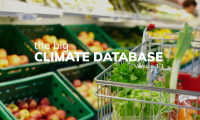Background Information

What we eat and drink has a major impact on the climate. Reducing food waste and eating a more plant-rich diet are therefore among the key elements in a transition of the world’s food system. Consumers and professional actors in the food retail and food service sectors are increasingly demanding information about the climate footprint of the products they buy and sell.
The Big Climate Database from CONCITO, Denmark’s green think tank, gives companies , authorities and the public free access to life cycle assessments of the climate impact of more than 500 of the most common food products on the Danish market. The database is a unique tool, and it sheds light on the climate impact of our food consumption more accurately than ever before, thus promoting more climate-friendly dietary habits.
Version 1 of The Big Climate Database has been published by CONCITO in collaboration with 2.-0 LCA consultants and with funding from the Salling Foundations and version 1.1 is financed with the price money from the Nordic Council's Environment Prize 2021.
The database is the world’s first publicly accessible database with consistent, detailed and transparent calculations of the average climate footprint of a great many different food products. Emissions for all products have been broken down by agriculture, indirect land use change (ILUC), processing, packaging, transport and retail trade.
The information in The Big Climate Database is dynamic and is only meant to provide general knowledge and guidance. Regardless of these reservations, The Big Climate Database constitutes the most detailed, accurate and true database to date of the climate footprint of food consumption on the Danish market, and the database is suitable for:
- Calculating the climate footprint of recipes, food plans, etc.
- Calculating the climate footprint of food purchases by companies and households
- Ranking types of food product to simplify climate labelling
- Providing information and training on the climate footprint of food products.
Although The Big Climate Database can be used for many different purposes, it cannot - on its own - serve as a basis for:
- Climate impact labelling, marketing or taxation of specific food products: The average climate footprints in the climate database do not reflect the large variation that may exist within each product type, and the results therefore neither present a true and fair, nor an adequate basis for labelling, claiming health benefits, or imposing taxation with regard to specific products.
- Sustainability assessments: The calculations in the climate database do not take other environmental, social or economic sustainability parameters into account.
- Dietary guidelines: Dietary choices focusing exclusively on minimising the climate footprint of food products do not necessarily ensure a healthy and nutritious diet.
When using the results from the database, reference should be made to:
”CONCITO (2024): The Big Climate Database, version 1.1”
